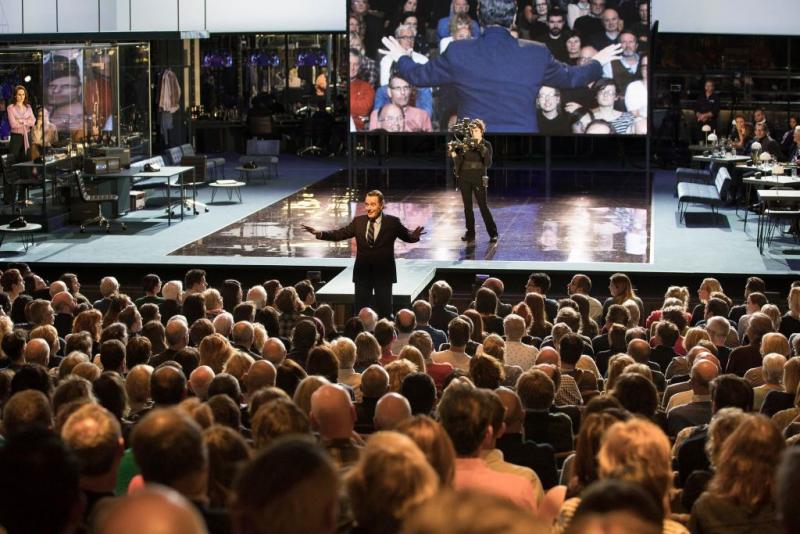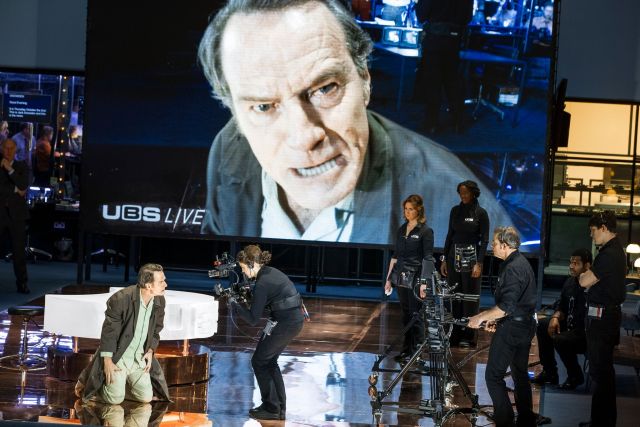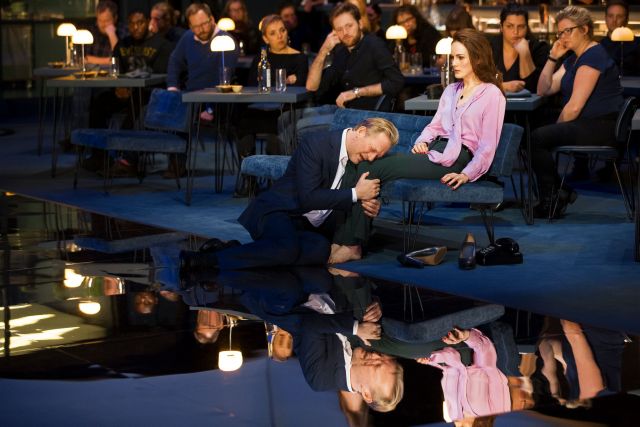Network, National Theatre review - Bryan Cranston’s searing London stage debut | reviews, news & interviews
Network, National Theatre review - Bryan Cranston’s searing London stage debut
Network, National Theatre review - Bryan Cranston’s searing London stage debut
Seminal 1976 film resonates anew as Breaking Bad star gets 'mad as hell'

Outrage knows no time barrier, as the world at large reminds us on a daily basis.
Indeed, pretty much everything the Breaking Bad star (and Broadway Tony winner) does hits the bullseye in what surely constitutes the most impressive British stage debut from an American actor in years. Far more even than I recall from the late, much-lamented Finch (who had died by the time he won an Oscar for the film), Cranston communicates fury where necessary, of course, but also panic, anxiety and against expectation a gathering zen.
Most importantly given the whirligig of a staging that surrounds him, he remains throughout an interval-free two hours the crumbling but also surprisingly cool epicentre of a production busily competing for attention on multiple fronts. The visual melee includes spectators to one side who are seen eating a gourmet dinner while they watch the show – a gambit that gives new meaning to that time-honoured American notion of the TV dinner. The same crowd gets an up close and personal view of the play's most graphic sexual encounter, though several among the press night attendees seemed determined not to look. Cranston maintains riveting command over the rise and fall and unexpected rise of the emotionally bottomed-out Beale, whose suicidal despondency ("I just ran out of bullshit") casts him as a media sensation in "this demented slaughterhouse" that we call life. Maybe it's because this is happening in a building that knows its classical repertoire, but Cranston at various moments puts one in mind of Beckett and even Lear in his embrace of the nothingness that Beale sees before him. And when he references with preternatural calm "the final revelation [that] is at hand", we feel as if we are listening to both the smartest man alive and also one of the most disturbed. (In physical terms, devotees of the film may be amused to note how much the actor in fact resembles not Finch but his craggy, firm-jawed co-star, William Holden.)
Cranston maintains riveting command over the rise and fall and unexpected rise of the emotionally bottomed-out Beale, whose suicidal despondency ("I just ran out of bullshit") casts him as a media sensation in "this demented slaughterhouse" that we call life. Maybe it's because this is happening in a building that knows its classical repertoire, but Cranston at various moments puts one in mind of Beckett and even Lear in his embrace of the nothingness that Beale sees before him. And when he references with preternatural calm "the final revelation [that] is at hand", we feel as if we are listening to both the smartest man alive and also one of the most disturbed. (In physical terms, devotees of the film may be amused to note how much the actor in fact resembles not Finch but his craggy, firm-jawed co-star, William Holden.)
Cranston is the main draw in a stage premiere that marks van Hove's continuing embrace of celebrity (his forthcoming All About Eve will star Cate Blanchett). But the director also leaves his signature imprint on material that more or less demands the technological legerdemain we have often seen from van Hove and his designer Jan Versweyveld. The Lyttelton stage seethes with activity that looks as if it might just burst the back wall. That is precisely what happens when Howard's fellow newsman Max (Douglas Henshall, making something newly vivid out of Holden's screen role) pursues his adulterous liaison with Howard's producer, Diana, via an intimate chat that takes the pair out the door of the National and into the night air. It's only a shame that Michelle Dockery (pictured above with Henshall), following on from Faye Dunaway's matchless rapacity onscreen, registers not as the "wasteland" she is said to be but as a comparative nonentity who is also saddled with the more boilerplate passages in Lee Hall's rewrite of Paddy Chayefsky's era-defining screenplay. How much could anyone do with stuff like "It's been handed to us on a plate; let's not blow it."
It's only a shame that Michelle Dockery (pictured above with Henshall), following on from Faye Dunaway's matchless rapacity onscreen, registers not as the "wasteland" she is said to be but as a comparative nonentity who is also saddled with the more boilerplate passages in Lee Hall's rewrite of Paddy Chayefsky's era-defining screenplay. How much could anyone do with stuff like "It's been handed to us on a plate; let's not blow it."
Nor, given that both Dunaway and co-star Beatrice Straight also won Oscars for their performances in the film, can Caroline Faber make much of the pro forma despair of Max's long-suffering wife. The men grab pride of place – not just Cranston and Henshall but also the terrific Richard Cordery as the Southern-accented bigwig (Ned Beatty's role in the movie) who holds forth on a climate in which nationhood and politics are subsidiary to the all-consuming power of money. That pronouncement certainly registers in our Trumpian times, which perhaps explains the closing video sequence of presidential inaugurals that elicits cheers at the sight of Obama and boos and catcalls for 45. (Presumably this production doesn't have a tour of America's red states on the cards.)
What are we left with once the smoke and mirrors of the techno-wizardry clears, and those of a certain age have got over the excitement at projections of banner American TV commercials of the era (Almond Joy! Charmin toilet paper!)? Replace the call to arms about resisting the sinuous allure of TV with today's far wider incursion into our lives of gadgetry, and the play makes many a valid and powerful point. By the time we get to Howard's climactic appeal to humankind as the last bulwark against the everyday onslaught of the impersonal, a play steeped in one man's capacity to be "mad as hell" leaves us sad as hell.
- Network at the National Theatre until 24 March.
- Read more theatre reviews on theartsdesk
The future of Arts Journalism
You can stop theartsdesk.com closing!
We urgently need financing to survive. Our fundraising drive has thus far raised £49,000 but we need to reach £100,000 or we will be forced to close. Please contribute here: https://gofund.me/c3f6033d
And if you can forward this information to anyone who might assist, we’d be grateful.

Subscribe to theartsdesk.com
Thank you for continuing to read our work on theartsdesk.com. For unlimited access to every article in its entirety, including our archive of more than 15,000 pieces, we're asking for £5 per month or £40 per year. We feel it's a very good deal, and hope you do too.
To take a subscription now simply click here.
And if you're looking for that extra gift for a friend or family member, why not treat them to a theartsdesk.com gift subscription?
more Theatre
 Troilus and Cressida, Globe Theatre review - a 'problem play' with added problems
Raucous and carnivalesque, but also ugly and incomprehensible
Troilus and Cressida, Globe Theatre review - a 'problem play' with added problems
Raucous and carnivalesque, but also ugly and incomprehensible
 Clarkston, Trafalgar Theatre review - two lads on a road to nowhere
Netflix star, Joe Locke, is the selling point of a production that needs one
Clarkston, Trafalgar Theatre review - two lads on a road to nowhere
Netflix star, Joe Locke, is the selling point of a production that needs one
 Ghost Stories, Peacock Theatre review - spirited staging but short on scares
Impressive spectacle saves an ageing show in an unsuitable venue
Ghost Stories, Peacock Theatre review - spirited staging but short on scares
Impressive spectacle saves an ageing show in an unsuitable venue
 Hamlet, National Theatre review - turning tragedy to comedy is no joke
Hiran Abeyeskera’s childlike prince falls flat in a mixed production
Hamlet, National Theatre review - turning tragedy to comedy is no joke
Hiran Abeyeskera’s childlike prince falls flat in a mixed production
 Rohtko, Barbican review - postmodern meditation on fake and authentic art is less than the sum of its parts
Łukasz Twarkowski's production dazzles without illuminating
Rohtko, Barbican review - postmodern meditation on fake and authentic art is less than the sum of its parts
Łukasz Twarkowski's production dazzles without illuminating
 Lee, Park Theatre review - Lee Krasner looks back on her life as an artist
Informative and interesting, the play's format limits its potential
Lee, Park Theatre review - Lee Krasner looks back on her life as an artist
Informative and interesting, the play's format limits its potential
 Measure for Measure, RSC, Stratford review - 'problem play' has no problem with relevance
Shakespeare, in this adaptation, is at his most perceptive
Measure for Measure, RSC, Stratford review - 'problem play' has no problem with relevance
Shakespeare, in this adaptation, is at his most perceptive
 The Importance of Being Earnest, Noël Coward Theatre review - dazzling and delightful queer fest
West End transfer of National Theatre hit stars Stephen Fry and Olly Alexander
The Importance of Being Earnest, Noël Coward Theatre review - dazzling and delightful queer fest
West End transfer of National Theatre hit stars Stephen Fry and Olly Alexander
 Get Down Tonight, Charing Cross Theatre review - glitz and hits from the 70s
If you love the songs of KC and the Sunshine Band, Please Do Go!
Get Down Tonight, Charing Cross Theatre review - glitz and hits from the 70s
If you love the songs of KC and the Sunshine Band, Please Do Go!
 Punch, Apollo Theatre review - powerful play about the strength of redemption
James Graham's play transfixes the audience at every stage
Punch, Apollo Theatre review - powerful play about the strength of redemption
James Graham's play transfixes the audience at every stage
 The Billionaire Inside Your Head, Hampstead Theatre review - a map of a man with OCD
Will Lord's promising debut burdens a fine cast with too much dialogue
The Billionaire Inside Your Head, Hampstead Theatre review - a map of a man with OCD
Will Lord's promising debut burdens a fine cast with too much dialogue

Add comment